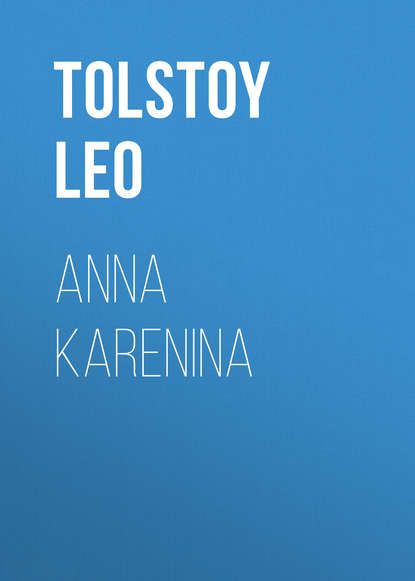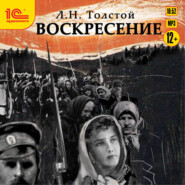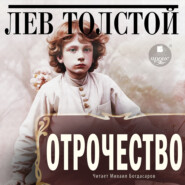По всем вопросам обращайтесь на: info@litportal.ru
(©) 2003-2024.
✖
Anna Karenina
Настройки чтения
Размер шрифта
Высота строк
Поля
"Where is he?"
"Maybe he’s gone into the passage, but here he comes anyway. That is he," said the doorkeeper, pointing to a strongly built, broad-shouldered man with a curly beard, who, without taking off his sheepskin cap, was running lightly and rapidly up the worn steps of the stone staircase. One of the members going down – a lean official with a portfolio – stood out of his way and looked disapprovingly at the legs of the stranger, then glanced inquiringly at Oblonsky.
Stepan Arkadyevitch was standing at the top of the stairs. His good-naturedly beaming face above the embroidered collar of his uniform beamed more than ever when he recognized the man coming up.
"Why, it’s actually you, Levin, at last!" he said with a friendly mocking smile, scanning Levin as he approached. "How is it you have deigned to look me up in this den?" said Stepan Arkadyevitch, and not content with shaking hands, he kissed his friend. "Have you been here long?"
"I have just come, and very much wanted to see you," said Levin, looking shyly and at the same time angrily and uneasily around.
"Well, let’s go into my room," said Stepan Arkadyevitch, who knew his friend’s sensitive and irritable shyness, and, taking his arm, he drew him along, as though guiding him through dangers.
Stepan Arkadyevitch was on familiar terms with almost all his acquaintances, and called almost all of them by their Christian names: old men of sixty, boys of twenty, actors, ministers, merchants, and adjutant-generals, so that many of his intimate chums were to be found at the extreme ends of the social ladder, and would have been very much surprised to learn that they had, through the medium of Oblonsky, something in common. He was the familiar friend of everyone with whom he took a glass of champagne, and he took a glass of champagne with everyone, and when in consequence he met any of his disreputable chums, as he used in joke to call many of his friends, in the presence of his subordinates, he well knew how, with his characteristic tact, to diminish the disagreeable impression made on them. Levin was not a disreputable chum, but Oblonsky, with his ready tact, felt that Levin fancied he might not care to show his intimacy with him before his subordinates, and so he made haste to take him off into his room.
Levin was almost of the same age as Oblonsky; their intimacy did not rest merely on champagne. Levin had been the friend and companion of his early youth. They were fond of one another in spite of the difference of their characters and tastes, as friends are fond of one another who have been together in early youth. But in spite of this, each of them – as is often the way with men who have selected careers of different kinds – though in discussion he would even justify the other’s career, in his heart despised it. It seemed to each of them that the life he led himself was the only real life, and the life led by his friend was a mere phantasm. Oblonsky could not restrain a slight mocking smile at the sight of Levin. How often he had seen him come up to Moscow from the country where he was doing something, but what precisely Stepan Arkadyevitch could never quite make out, and indeed he took no interest in the matter. Levin arrived in Moscow always excited and in a hurry, rather ill at ease and irritated by his own want of ease, and for the most part with a perfectly new, unexpected view of things. Stepan Arkadyevitch laughed at this, and liked it. In the same way Levin in his heart despised the town mode of life of his friend, and his official duties, which he laughed at, and regarded as trifling. But the difference was that Oblonsky, as he was doing the same as every one did, laughed complacently and good-humoredly, while Levin laughed without complacency and sometimes angrily.
"We have long been expecting you," said Stepan Arkadyevitch, going into his room and letting Levin’s hand go as though to show that here all danger was over. "I am very, very glad to see you," he went on. "Well, how are you? Eh? When did you come?"
Levin was silent, looking at the unknown faces of Oblonsky’s two companions, and especially at the hand of the elegant Grinevitch, which had such long white fingers, such long yellow filbert-shaped nails, and such huge shining studs on the shirt-cuff, that apparently they absorbed all his attention, and allowed him no freedom of thought. Oblonsky noticed this at once, and smiled.
"Ah, to be sure, let me introduce you," he said. "My colleagues: Philip Ivanitch Nikitin, Mihail Stanislavitch Grinevitch" – and turning to Levin – "a district councilor, a modern district councilman, a gymnast who lifts thirteen stone with one hand, a cattle-breeder and sportsman, and my friend, Konstantin Dmitrievitch Levin, the brother of Sergey Ivanovitch Koznishev."
"Delighted," said the veteran.
"I have the honor of knowing your brother, Sergey Ivanovitch," said Grinevitch, holding out his slender hand with its long nails.
Levin frowned, shook hands coldly, and at once turned to Oblonsky. Though he had a great respect for his half-brother, an author well known to all Russia, he could not endure it when people treated him not as Konstantin Levin, but as the brother of the celebrated Koznishev.
"No, I am no longer a district councilor. I have quarreled with them all, and don’t go to the meetings any more," he said, turning to Oblonsky.
"You’ve been quick about it!" said Oblonsky with a smile. "But how? why?"
"It’s a long story. I will tell you some time," said Levin, but he began telling him at once. "Well, to put it shortly, I was convinced that nothing was really done by the district councils, or ever could be," he began, as though some one had just insulted him. "On one side it’s a plaything; they play at being a parliament, and I’m neither young enough nor old enough to find amusement in playthings; and on the other side" (he stammered) "it’s a means for the coterie of the district to make money. Formerly they had wardships, courts of justice, now they have the district council – not in the form of bribes, but in the form of unearned salary," he said, as hotly as though someone of those present had opposed his opinion.
"Aha! You’re in a new phase again, I see – a conservative," said Stepan Arkadyevitch. "However, we can go into that later."
"Yes, later. But I wanted to see you," said Levin, looking with hatred at Grinevitch’s hand.
Stepan Arkadyevitch gave a scarcely perceptible smile.
"How was it you used to say you would never wear European dress again?" he said, scanning his new suit, obviously cut by a French tailor. "Ah! I see: a new phase."
Levin suddenly blushed, not as grown men blush, slightly, without being themselves aware of it, but as boys blush, feeling that they are ridiculous through their shyness, and consequently ashamed of it and blushing still more, almost to the point of tears. And it was so strange to see this sensible, manly face in such a childish plight, that Oblonsky left off looking at him.
"Oh, where shall we meet? You know I want very much to talk to you," said Levin.
Oblonsky seemed to ponder.
"I’ll tell you what: let’s go to Gurin’s to lunch, and there we can talk. I am free till three."
"No," answered Levin, after an instant’s thought, "I have got to go on somewhere else."
"All right, then, let’s dine together."
"Dine together? But I have nothing very particular, only a few words to say, and a question I want to ask you, and we can have a talk afterwards."
"Well, say the few words, then, at once, and we’ll gossip after dinner."
"Well, it’s this," said Levin; "but it’s of no importance, though."
His face all at once took an expression of anger from the effort he was making to surmount his shyness.
"What are the Shtcherbatskys doing? Everything as it used to be?" he said.
Stepan Arkadyevitch, who had long known that Levin was in love with his sister-in-law, Kitty, gave a hardly perceptible smile, and his eyes sparkled merrily.
"You said a few words, but I can’t answer in a few words, because… Excuse me a minute…"
A secretary came in, with respectful familiarity and the modest consciousness, characteristic of every secretary, of superiority to his chief in the knowledge of their business; he went up to Oblonsky with some papers, and began, under pretense of asking a question, to explain some objection. Stepan Arkadyevitch, without hearing him out, laid his hand genially on the secretary’s sleeve.
"No, you do as I told you," he said, softening his words with a smile, and with a brief explanation of his view of the matter he turned away from the papers, and said: "So do it that way, if you please, Zahar Nikititch."
The secretary retired in confusion. During the consultation with the secretary Levin had completely recovered from his embarrassment. He was standing with his elbows on the back of a chair, and on his face was a look of ironical attention.
"I don’t understand it, I don’t understand it," he said.
"What don’t you understand?" said Oblonsky, smiling as brightly as ever, and picking up a cigarette. He expected some queer outburst from Levin.
"I don’t understand what you are doing," said Levin, shrugging his shoulders. "How can you do it seriously?"
"Why not?"
"Why, because there’s nothing in it."
"You think so, but we’re overwhelmed with work."
"On paper. But, there, you’ve a gift for it," added Levin.
"That’s to say, you think there’s a lack of something in me?"
"Perhaps so," said Levin. "But all the same I admire your grandeur, and am proud that I’ve a friend in such a great person. You’ve not answered my question, though," he went on, with a desperate effort looking Oblonsky straight in the face.
"Oh, that’s all very well. You wait a bit, and you’ll come to this yourself. It’s very nice for you to have over six thousand acres in the Karazinsky district, and such muscles, and the freshness of a girl of twelve; still you’ll be one of us one day. Yes, as to your question, there is no change, but it’s a pity you’ve been away so long."
"Oh, why so?" Levin queried, panic-stricken.
"Oh, nothing," responded Oblonsky. "We’ll talk it over. But what’s brought you up to town?"
"Oh, we’ll talk about that, too, later on," said Levin, reddening again up to his ears.

















